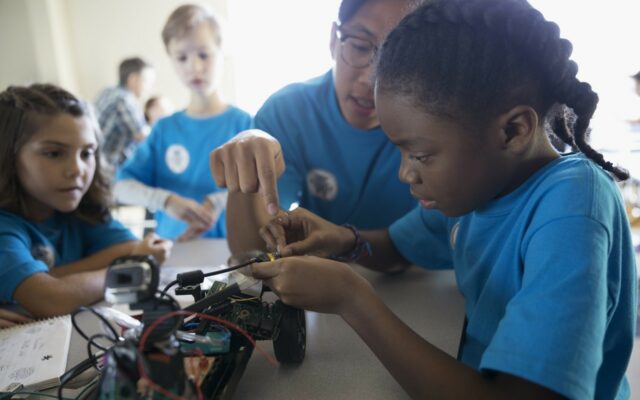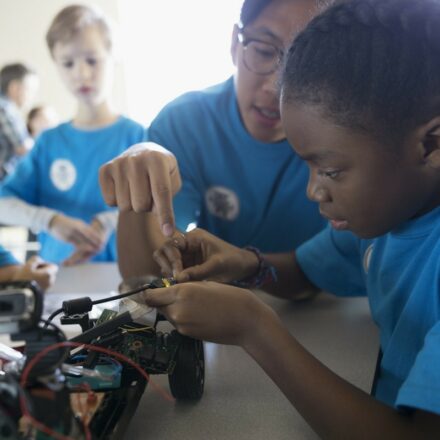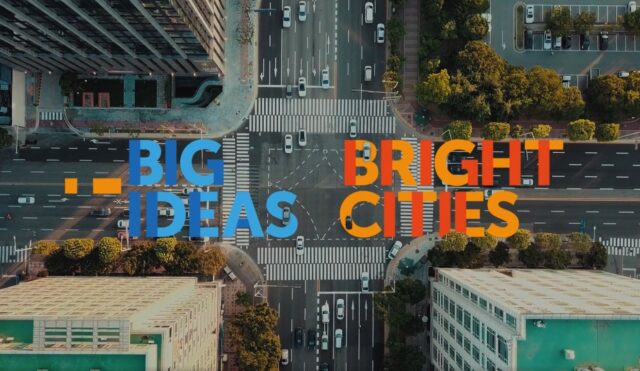This blog is co-authored by Justin van Fleet, Executive Director of Global Business Coalition for Education.
Today, World Youth Skills Day, is a natural moment for us to reflect on how we can collectively support the almost two billion young people without adequate access to skills and opportunities.
That’s why Justin van Fleet, Executive Director of Global Business Coalition for Education, and I recently sat down for a conversation to discuss the ongoing partnership which is focused on skill-building, as well as how businesses can prepare today’s youth for success in the future workforce. A great partner to tap into as their mission is to ensure every child has the best start in life, a safe place to learn, and skills for the future.
The pandemic has deepened the youth skills gap and heightened the employment crisis. Emerging technologies are transforming workforce needs with an alarming number of jobs historically held by youth at risk of becoming completely automated. According to a PWC survey, 36% of CEOs say they’re focused on improving productivity through technology, which is more than double the percentage from 2016.
Why are partnerships so important to addressing the youth skills gap?
Justin: Today 260 million young people are not going to school and it is estimated that by 2030, more than half of all young people, won’t have the most basic skills to enter the workforce. We’re leaving behind half of the next generation of potential.
The challenge of ensuring our youth are equipped with the skills they need to thrive in today’s workforce is bigger than any one organization. That is where partnership comes into the fold. Whether that be a company like Dell, an organization like us, city leaders, or youth-serving organizations and other businesses – we can start to create these new ecosystems and resources for young people so they can progress through the education system and can succeed. Dell Technologies understands these challenges and has the expertise to build skills.
Why has Dell Technologies partnered with the Global Business Coalition?
Jessica: Dell started partnering with the Global Business Coalition before the pandemic. It started with an engagement in EMEA while trying to identify organizations that we could potentially extend an invitation to be part of our strategic grant program. Our team had been in touch with the Global Business Coalition and through conversations we engaged in a partnership around the Bright Ideas, Bright Cities Challenge. The purpose was to encourage cities to come up with ideas to prepare and empower young people with the next generation of skills they will need.
How important is it to work on youth skills at a city level?
Justin: It’s extremely important to work on issues at the community level. If we look at where people are – we look at cities where there’s an opportunity for mayors to work with city council to make decisions that affect education, school systems, job training programs. These decisions can affect hundreds of thousands of young people in a more flexible nature than some of the national policy structures. The idea was to find a more collaborative way to bring these ideas together at a local level.
The Big Ideas, Bright Cities Challenge was born from this idea, encouraging U.S. cities to come up with big ideas to help prepare the next generation. We had over 50 cities participate, and every idea reflected the diversity of the participants. The winning organization – Action Greensboro – connects young people, including low income and first-generation college students, with paid internships with women and minority owned small businesses.
Any advice for other businesses willing to engage in skills and education?
Jessica: Definitely would say not being afraid to bring partners into the fold is great advice. Finding the right strategic partner that aligns with your own company’s mission, vision, values and goals will give you a common foundation from day one. Secondly, I think it’s important to build your business case internally to secure support from the top-down and secure teammates for the most sustainable impact. Lastly, start small and expand. While there is lots of work to be done, you have to focus on the quality of the initiatives versus the quantity to start.
Another way for businesses to engage is through leveraging the passion and expertise of their employee base. Through our Pro Bono Portfolio, we aim to support the digital transformation of charities around the world. iNERDE and Junior Achievement Americas are just two examples of charities we’ve supported.
What are some of the most encouraging success stories you’ve encountered as part of your work in equipping the next generation with skills they need to succeed?
Justin: This project with Dell is definitely at the top of my list. We have also been able to mobilize partners, businesses and governments together around education and skilling for over the 75 million children and young people with their education disrupted due to conflict. We’ve set up a fund and mobilized resources for children in crisis so that they don’t fall behind. We’ve created programs for children affected by the conflict in Syria, in South Sudan and now in Ukraine. Finally, we have an MBA program where we have 20 new students affected by the Syria conflict.
Jessica: Some of the most successful models that I’ve seen all have some sort of hands-on learning. While traditional learning models still exist, from what I’ve seen, some of the best ways young people are able to grasp a concept or a skill– allowing them to be able to execute or become proficient–always has some sort of hands-on component. That’s why we at Dell support hands-on opportunities. In the end, you want to be able to show some employer down the road that yes, not only do I learn to understand the concepts of a particular job or skill set, but I’ve also had hands on experiences as well to learn it.


